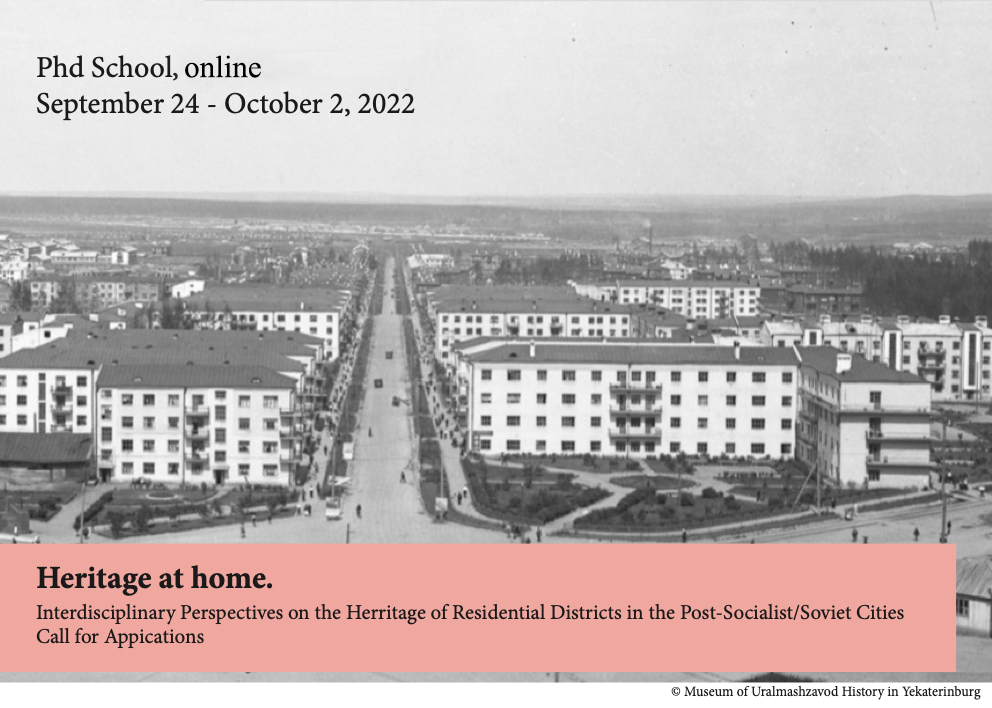PhD School, Yekaterinburg, Russia - Call for Applications (24.9 – 2.10.2022)

Heritage at Home. Interdisciplinary Perspectives on the Heritage of Residential Districts in the Post-Socialist/Soviet Cities
as part of the collaborative research project CITIES.BUILDING.CULTURE
Topic
The PhD School will focus on critically discussing concepts and practices of heritage in residential districts. Seen primarily through their socio-economic role i.e., providing housing for the city’s inhabitants, such areas are much more than mere urban landscapes of uniform, ordinary architecture. They are characterized, on one hand, by a high degree of place attachment of the residents/local community, while, on the other hand, the value of this built environment – from local vernacular to modern mass housing projects – is rarely acknowledged by preservation authorities. As a result, historic districts face a higher risk of neglect, mismanagement, and even demolition because of property redevelopment interests and weaker mechanisms of protection. The discussions will explore the specificity of housing as heritage from an interdisciplinary perspective and multiple viewpoints:
-
Top-down (heritage as constructed and used by state actors, official policies and legislation)
-
Bottom-up (grass-root movements, civic activism, personal stories)
-
Inside-out (connections between private and public spaces, personal stories and official narratives, tangible and intangible heritage, built and natural environments)
As we consider heritage as a dynamic process, the purpose is not so much on adopting one perspective alone, but on identifying intersections between these strategies of analysis. Also, of particular interest are contributions trying to bridge theory and practice when analyzing specific case studies that demonstrate how heritage is conceptualized, perceived, negotiated, contested, or ignored in residential districts.
Following our project’s regional focus, we aim to critically discuss different case studies from the post-socialist and post-Soviet space, while also encouraging comparisons with cities beyond these areas. In which ways does the specific political and socio-economic context influence perceptions, attitudes and policies on heritage in residential districts? What similarities and differences can we identify between CEE countries, some of which are now EU members, and post-Soviet states? How is the built legacy of socialism perceived and what kind of tensions does it generate in various local contexts? What kind of long-term continuities can one observe (cultural, institutional), and what is the impact of ruptures on the perception and management of built heritage? How can we integrate concepts of sustainability in discussions regarding the present and future of historic districts?The papers will be divided into four thematic sessions, according to our project’s main areas of interest:
-
Values (Attitudes, Perceptions)
-
Institutionalized Practices (Institutional Actors and Practices)
-
Civic Practices (Residents and Activists. Performing Heritage)
-
Spatial Transformations (Places. Morphology and Change)
Format
The PhD School is designed for doctoral researchers interested in heritage studies and urban development, coming from a variety of disciplines, such as architecture and urban planning, art history, urban geography, economics, sociology, anthropology. Besides panel sessions and workshops, which represent the main formats for academic exchange, the participants will also be attending a conference with regional experts and activists, and will join a one-day fieldtrip. Thus, they will be able not only to present their research and receive feedback from established scholars, but also to interact with fellow young researchers, listen to the opinions of experts, and explore the fascinating architectural heritage of Yekaterinburg and the Sverdlovsk region.
Participants will benefit from the experience of established academics from Germany, Russia and beyond.
Doctoral students and early career researchers are invited to submit proposals. We encourage submissions using innovative conceptual and methodological approaches coming from various academic disciplines, bridging between theory and practice.
Fees, travel and accommodation
Attending the PhD School is free of charge. Furthermore, funding can be provided to cover flight and/or train tickets (up to 500 euro/person, to be reimbursed after the school), the cost of accommodation and the conference meals. Participants are strongly encouraged to apply for additional funding from their home institutions.
Please send your applications (500 words summary of your research project and one-page CV with contact details) at iuga ∂does-not-exist.staedtebau rwth-aachen de by March 31, 2022. For more information on the project, please visit our website https://cities-building-culture.com/.
Successful applicants will be notified by email no later than May 1, 2022. Ideally, the event will take place in person. However, given the current situation, participants will be informed by August 1, 2022 if the PhD School will switch to a hybrid/online format.
Click here to download a flyer.
